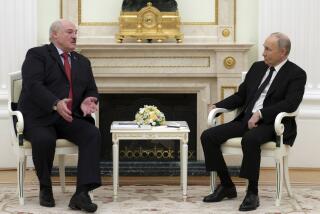Gorbachev Distorts Record of Geneva Talks, U.S. Says
- Share via
WASHINGTON — The Reagan Administration, in its toughest public reproach of the Soviet Union since the Geneva arms control talks resumed, accused Soviet leader Mikhail S. Gorbachev on Thursday of distorting the record of the talks and threatening a walkout by Moscow.
Gorbachev had warned in a lengthy televised speech Wednesday that the Soviets would “reassess the entire situation” of the talks if the United States continues “marking time.”
“We are astonished by Mr. Gorbachev’s distorted characterization of the Geneva negotiations, and by his thinly veiled threat to suspend the talks. . . .,” State Department spokesman Edward P. Djerejian responded in a prepared statement. “It is the Soviet Union, and not the United States, that is ‘marking time’ in the negotiations.”
Gorbachev’s accusations, delivered in a speech on mostly domestic issues, were one of a series of recent Soviet attempts to cast blame on the United States for the apparent deadlock in Geneva.
Linkage Demanded
Since the first round of negotiations began last winter, the Soviets have been unyielding in insisting that progress in the areas of both offensive and defensive weapons should be linked--a demand that includes an effort to force the Administration to abandon its so-called “Star Wars” space-based missile defense program.
Meanwhile, U.S. irritation with Moscow on this issue has been rising for some time. Earlier this week, Paul H. Nitze, President Reagan’s special arms control adviser, told reporters that the Soviets had almost nothing new to offer at Geneva and had been doing little more than restating proposals put forward during Reagan’s first term.
Nitze said he doubts that any progress will be seen in the latest round of talks that began in May unless Gorbachev and his colleagues in the Politburo show the political will to “take a new decision.”
In its statement Thursday, the State Department made a similar point. When the Soviets walked out of the previous arms talks in late 1983, it noted, they set back the chances for any arms control progress for more than a year.
Doubt-Casting Move
“The Soviet Union’s apparent threat to suspend the ongoing new negotiations casts doubt on its seriousness in the talks,” Djerejian added.
He continued, “After almost two full rounds of talks, we have yet to see any concrete new proposals for the reduction of offensive nuclear arms. Instead, the Soviet delegation has sought unilaterally to impose preconditions, linking discussion of nuclear arms reductions to prior U.S. agreement to Soviet demands that we abandon research under the Strategic Defense Initiative,” as the “Star Wars” program is formally known.
Reflecting a long-held Administration position, Djerejian branded that demand “hypocrisy”--which, he said, was “all the more striking when one considers the fact that it is the Soviet Union which has the world’s only deployed ABM (anti-ballistic missile) system and operational anti-satellite system.”
The State Department also cited the massive phased-array radar system under construction in Siberia--an installation widely held to be in violation of the 1972 treaty sharply limiting deployment of ABM systems.
Despite the harsh language of the statement he read out, Djerejian said the Administration remains interested in a meeting between Reagan and Gorbachev when one can be arranged.
“That situation remains,” he declared. “It is yet to be decided on a time and place for such a meeting.”
More to Read
Sign up for Essential California
The most important California stories and recommendations in your inbox every morning.
You may occasionally receive promotional content from the Los Angeles Times.













